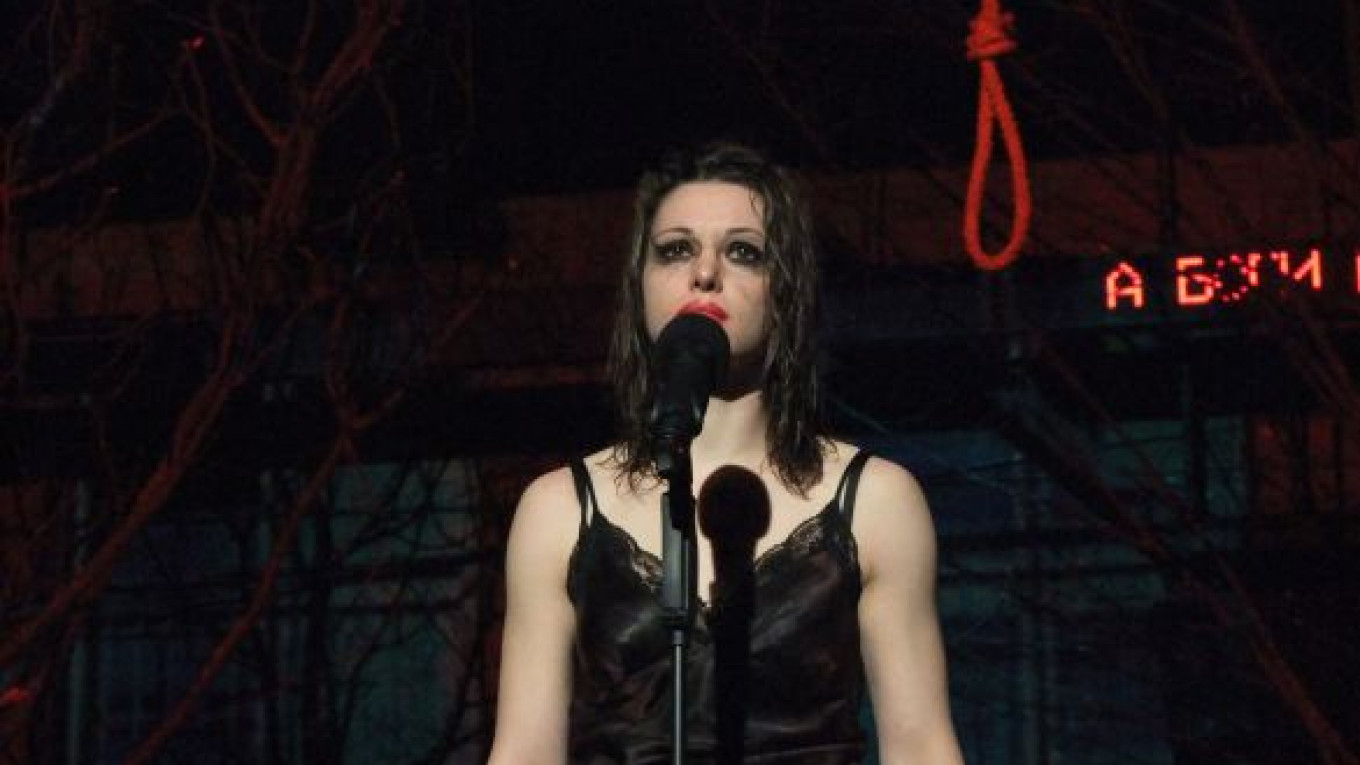Yury Butusov has a way of exploding a play from the inside out. He goes down inside and comes back to the surface with all kinds of things you may never have considered. His productions remind me of the Pompidou Center in Paris: It's a building like any other, only all the stuff from the inside is on the outside.
It's beautiful, and it's thought provoking.
All of this applies to Butusov's latest production, Bertolt Brecht's "The Good Person of Setzuan" at the Pushkin Theater. It's big, it's long, it's energetic and it's familiar and totally unfamiliar at the same time.
The story you likely know well: Some gods descend to earth in search of "a good person." They resolve to help Shen Te, a poor prostitute who uses a reward they give her to buy a tobacco shop and try to start a normal life. But when her shop is overrun by freeloaders, she takes to impersonating a non-existent cousin Shui Ta who mercilessly puts everyone in their place, and generally, ends up wreaking havoc.
How easy is it to be a good person in this world then?
Designed by Alexander Shishkin, lighted by Alexander Sivayev and choreographed by Nikolai Reutov, this show has a wide-open feel. Shishkin stripped everything on stage back to the brick walls and metal stairs, even opening up storage pockets on the sides. In this cavernous space, chairs may be brought out, a trio of birch trees may fly in from above or a huge clothes rack of black suits may be rolled in. Photo projections of individuals or oddly colored building facades are cast against the back wall, seemingly with no unifying principle.
All of this contributes to the overriding sensation that the action takes place in a kind of magic warehouse that can be transformed with the wave of a hand.
Spread out at left stage is a live musical ensemble headed by Igor Gorsky that provides effective atmospheric sounds as well as note-perfect blues, jazz, rock and lounge accompaniment to the famous songs composed by Paul Dessau.
One of Butusov's boldest moves was to do nothing at all when adapting the songs. The cast sings all but a few in the original German. It is a stroke of genius, for it not only lends a sense of authenticity to the performances, it provides unexpected punch to the lyrics, which are provided in Russian translation by an electric ticker above the stage.
This cranks up the production's political impact. Where words could be lost amidst mellifluous or rhythmic singing, nothing is lost when they are put up over the stage in bright red electronic letters. They hit with the power of uncompromising aphorisms.
"They say that doors for us young people are open. Yes, but they lead to nowhere."
"In our country, if you want to do anything you need a patron."
Alexandra Ursulyak provides a tough, no-holds-barred performance of the "opposing cousins" Shen Te and Shui Ta. Short on mannerisms and long on substance, she paints a clear, compelling picture of an individual trapped by circumstance and the unfairness of humans and gods alike. Her final outburst, an emotional appeal to the audience, seals the entire production as a cry of the soul. To find out what I mean by that, you'll have to see the show.
Expect to hear Ursulyak's name bandied about frequently in season-end discussions of top actors.
Holding pace with Ursulyak at every turn is Alexander Matrosov in the role of Wang, the water seller. Tossing knowing, dignified smiles at spectators before "disappearing" into the depths of his tortured character, he, like Shen Te, is victim and victimizer both. You see his entire arc telegraphed in the first song he sings, when he wins our hearts with the first couplet and appalls us with the last.
Other excellent performers include Alexander Arsentyev as the egotistical pilot who wins Shen Te's heart then betrays her trust; Irina Petrova, who eccentrically plays Shen Te's cold-nosed landlady; Anastasia Lebedeva who plays three gods in one with a tangible air of mystery; and Anna Begunova, who turns in a hilariously grotesque impersonation of a hard-headed old woman.
In "The Good Person of Setzuan," Butusov continues his exciting interpretations of classics that began in past seasons with Shakespeare's "Richard III" and Chekhov's "The Seagull" at the Satirikon Theater. This one is already a highlight of the current season.
"The Good Person of Setzuan" (Dobry Chelovek iz Sezuana) plays March 22, April 5 and 12 at 7 p.m. at the Pushkin Theater, 23 Tverskoi Bulvar. Metro Pushkinskaya. Tel. +7 495-694-1289, 650-1896. www.teatrpushkin.ru. Running time: 3 hours, 30 minutes.
Contact the author at [email protected]
A Message from The Moscow Times:
Dear readers,
We are facing unprecedented challenges. Russia's Prosecutor General's Office has designated The Moscow Times as an "undesirable" organization, criminalizing our work and putting our staff at risk of prosecution. This follows our earlier unjust labeling as a "foreign agent."
These actions are direct attempts to silence independent journalism in Russia. The authorities claim our work "discredits the decisions of the Russian leadership." We see things differently: we strive to provide accurate, unbiased reporting on Russia.
We, the journalists of The Moscow Times, refuse to be silenced. But to continue our work, we need your help.
Your support, no matter how small, makes a world of difference. If you can, please support us monthly starting from just $2. It's quick to set up, and every contribution makes a significant impact.
By supporting The Moscow Times, you're defending open, independent journalism in the face of repression. Thank you for standing with us.
Remind me later.







